Russians Live On The Edge As Recession Spurs A Deep Poverty Spike
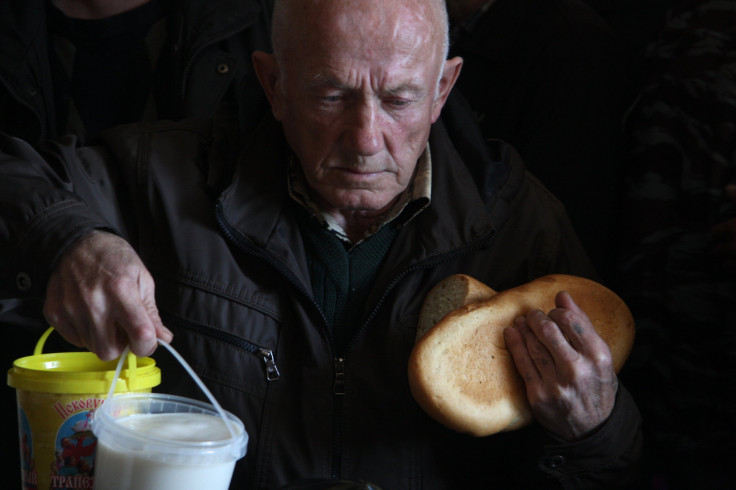
PSKOV, Russia — Making ends meet in the Bustrov household gets harder every month.
Valery Bustrov is unemployed, and his family, with three children, ages 15, 12 and 9, eke out a living on a small pension payment and a monthly salary of 13,000 rubles ($195) brought home by his wife Viktoriya, who works at the local rain boot factory.
Luxuries such as a new mobile phone, a new piece of furniture or a few weeks of vacation with relatives in the summer are now impossible. The Bustrovs sold their car last year.
“Of course, it’s become harder to live,” Viktoriya said. “With every year, everything is worse and worse. Prices rise, and there’s no stability. Salaries are not being increased.”
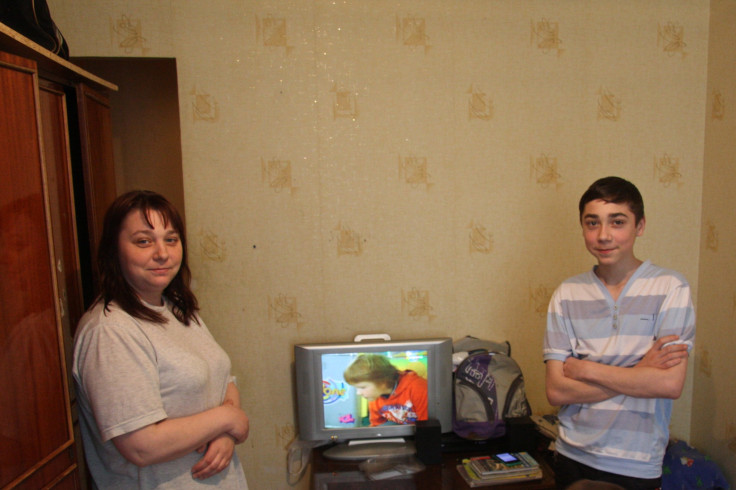
The Bustrovs are just one example of millions of Russian households struggling to stay afloat as the country’s economic recession, now in its second year, hits the poorest in society disproportionately hard. Last year, poverty in Russia jumped to its highest level since 2006, and this year, more than 20 million people — almost one in seven — are expected to be in penury.
Ordinary Russians have watched their spending power relentlessly squeezed by rapid inflation as the Russian economy tanked amid falling oil prices and Western sanctions on Moscow over the Ukraine crisis. Real wages in Russia dropped 9.5 percent last year, and a report published by a top Moscow university last month showed that, for the first time since 2008, average Russians are now spending more than 50 percent of their incomes on food.
The ongoing decline in living standards is “ending the gains of a whole decade of poverty reduction,” Birgit Hansl, the World Bank’s lead economist for Russia, said in Moscow last month.
Viktoriya Bustrov can talk at length about how money does not go as far as it once did. “When you get home and unpack your shopping bag, you realize you have barely bought anything,” she said.
The Bustrov family moved last year to the western Russian city of Pskov, 35 miles from the European Union border. The five of them now sleep in the one small room they rent for 6,000 rubles a month in a communal apartment block on the edge of the city center. They share a kitchen, a washroom and toilets with the tenants of 12 other rooms.
The Pskov region has the highest level of poverty in Russia’s northwest, and in 2014 it was named the hardest place in the country to raise a family.
By last year, one in five people in the Pskov region was living below the poverty line, the highest level in a decade, more than 50 percent higher than the national rate. The officially designated poverty threshold in the Pskov region last year was 10,266 rubles per person per month.
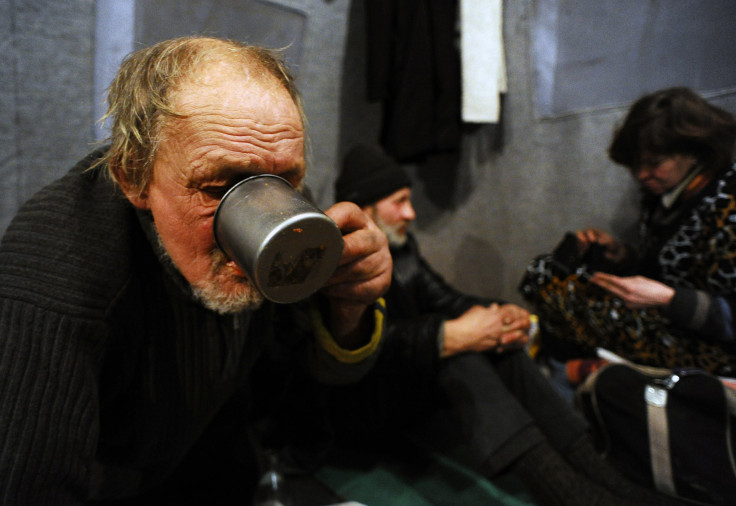
Hard-up Russians spend most of their earnings on day-to-day needs, such as food, clothes and medicine, and have been severely affected by inflation, which hit 12.9 percent last year due in large part to a collapse in the value of the Russian currency. They typically do not have either savings or access to long-term financing, such as residential mortgages or student loans.
Russian cities traditionally do not suffer from problems of slums or extreme, wealth-based segregation, but nongovernmental organization workers in Pskov said the current economic crisis was creating a clearer dividing line between “poor” and “rich” areas. Poverty in Pskov, as in Russia generally, is concentrated among multichild families; those living on state handouts, including pensioners; and state employees, particularly those in the low-paying health and education sectors.
Konstantin, who lives with his elderly parents in an apartment block neighboring the one housing the Bustrovs, has post-traumatic stress disorder after fighting as a soldier during the Soviet-Afghan War in the 1980s and is completely dependent on his monthly disability pension of 8,000 rubles.
Konstantin said he was particularly affected by a jump in the price of medicine as the cost of a pack of the 12 Indian-made tablets he takes for his PTSD has doubled.
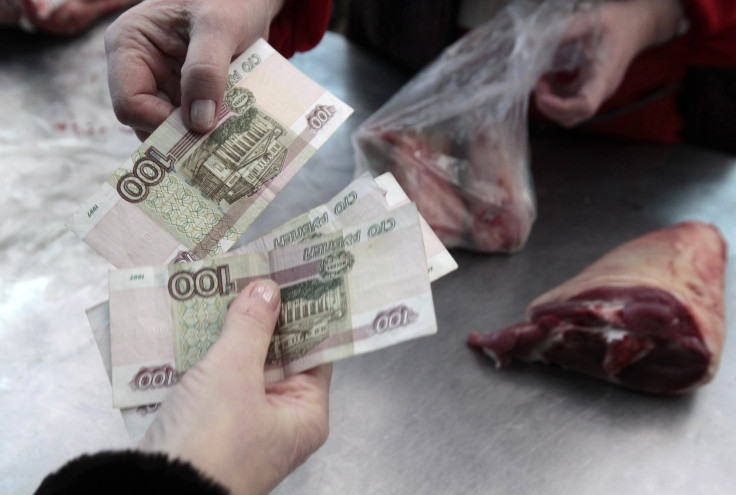
“We sent all that humanitarian aid to Donbass and to Syria, but we live here as if accursed,” Konstantin said, referring to Russian support for the rebels in Ukraine and the regime of Syrian President Bashar Assad.
While the number of people out of work ticked above 4.3 million this year, and officials expect the figure to continue climbing, the Russian unemployment rate of about 6 percent is comparatively low. But millions of Russians have seen their pay cut by enforced underemployment, and millions more work in the exploitation-ridden informal economy.
Valery Bustrov cannot find a job in Pskov, so he is studying online to become a security guard and plans to travel for work in St. Petersburg, 180 miles away. Before landing her job at the rain boot factory, Viktoriya Bustrov went to Moscow to work for a month at a refrigerator factory — but she said she was tricked and never received her wages.
Another Pskov resident, Aleksei, 23, was trained as a plumber, but he cannot find a plumbing job and said he has no choice other than to work unofficially at the city’s building sites.
“It goes like this,” Aleksei said. “You turn up to an interview, they take you on. They tell you your wages will be 30,000 a month. Great, 30,000! I’ll work for that. There’s no contract, nothing like that. You agree to meet the following day to start work. Here’s your boss. You start to work. All’s well. Here and there, all around the block. You work for a month, and you get 15,000. They say: ‘We haven’t finished various projects. You have to wait.’ Another month goes by, and they give you a little bit more. But the 30,000 is nowhere to be seen.”
Shortly after his father died in 2013, Aleksei was jailed for 18 months on theft charges, but since leaving prison he has helped his struggling mother support his two younger, school-age brothers. He doesn’t own his own tools, often works weekends for free and is paid only in cash.
“Most of your money goes on food,” Aleksei said.
At the extreme end of the poverty spectrum in Pskov are the city’s homeless. Marina Yelizarova, who runs the city’s only feeding center, funded by the Roman Catholic charity Caritas, said she has witnessed an increase in the number of people coming for free meals.
Not all those seeking free meals live on the street. Galina, 60, who was in the center last week, said she lived in a communal apartment but that she had no family and her pension was not big enough to feed herself. “They haven’t increased pensions, but food prices are rising,” she said.
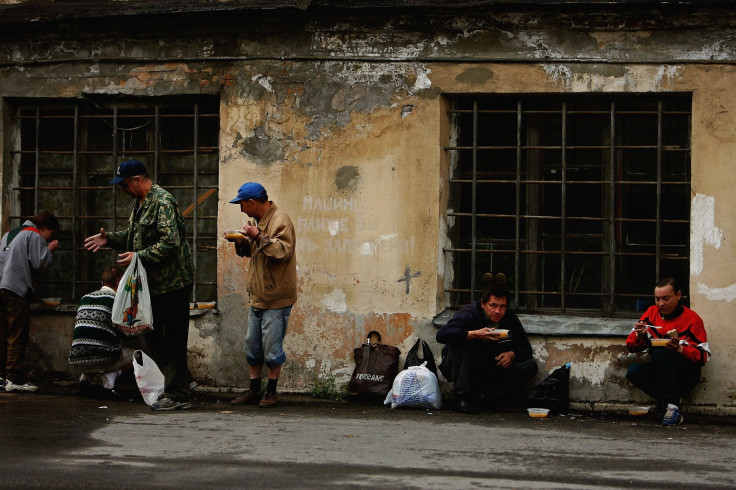
The head of the local branch of Russia’s Red Cross, Pyotr Vasilovsky, said more people had begun seeking humanitarian aid over the past year because of rising prices and unemployment. “It’s not, as all foreigners believe, because people lie around drunk all day,” he said.
Amid the growing hardship, Russian authorities have offered little other than lip service, although President Vladimir Putin went out of his way to display his empathy for people facing economic difficulties during a televised phone-in session last month. The cash-strapped Russian government, struggling to control its budget deficit, doesn’t have much in the way of available funds to tackle a solution to the problem.
The issue is also clouded by indifference and some secrecy. Putin said during the phone-in session that poverty had increased only “a little bit,” while the government was recently criticized for lowering the poverty threshold, a move that reduces poverty numbers on paper. When contacted by International Business Times, a representative for Foodbank Rus, Russia’s only charity organizing food banks across the country, said its policy was not to talk to foreign journalists.
The ongoing decline in living standards is “ending the gains of a whole decade of poverty reduction.”
With inflation stubbornly high and an economic contraction of as much as 2 percent forecasted for this year, few expect a reversal of the new trend soon. The World Bank has predicted 1.1 million Russians will enter poverty in 2016, and the country’s Analytical Center warned in a report this year that almost a third of Russian households face penury in the event the nation undergoes a long recession.
Experts do not expect a rise in indigency to translate into political opposition to Putin, whose high popularity ratings have remained largely undented over the past year. A poll released by the independent Levada Center Wednesday showed that more than three-quarters of Russians were unwilling to take part in political demonstrations protesting a decline in living standards.
Russians are known for their resilience, and many say the economic crisis of the 1990s was much harder on them. In the return of one coping strategy employed during the era of the Soviet Union, people are increasingly reliant on food they grow in their vegetable gardens. And some retailers have reported a surge in seed sales of 40 percent.
Back with the Bustrov family, there are fears about the future. “It’s not clear what will happen,” said Viktoriya Bustrov. “How can we live going forward?”
© Copyright IBTimes 2025. All rights reserved.






















